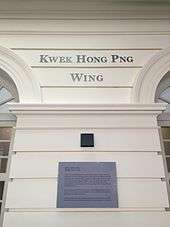Kwek Hong Png
Kwek Hong Png (simplified Chinese: 郭芳枫; traditional Chinese: 郭芳楓; pinyin: Guō Fāng Fēng; 1912 - 8 November 1994) was a Singaporean businessperson, known for establishing Hong Leong Group, of which he was also chairperson. Born to a penniless family, Kwek turned from rags to riches after arriving in Singapore in 1928, eventually becoming one of the world's richest men, with an estimated net worth of S$3 billion before his retirement in 1984.
Early life
Born 1913 in Fujian's Tung Ann district[1][2] to a miserly farmer,[3] Kwek arrived in Singapore in 1928 from Fujian.[4] He first started out as a shop helper[5] at his brother-in-law's hardware firm.[6] His monthly salary then was just $5[1] and he reportedly slept on the floors of the store.[7] During World War II, Kwek became rich by trading construction materials.[8] He also participated in smuggling basic goods[9] and traded with Japanese merchants.[10]
Career
Founded in 1941,[11] the Hong Leong Group was originally a trading company that supplied basic construction materials[12] and rubber.[13] Wanting to work as a team, Kwek subsequently beckoned his three brothers to join Hong Leong.[14][15] Becoming chairman of the organisation in 1956,[16] Kwek retired in 1984;[17] before that, his net worth was estimated by Forbes to be worth S$3 billion.[18] He was also ranked one of the wealthiest men in the world by Forbes.[19]
Lawsuit

In November 1989, a lawsuit was filed against Kwek for the misuse of funds as well as abetment.[19] Represented by G. P. Selvam, Kwek was later found guilty of the charges, with a pending charge of "dishonestly receiving stolen property". Kwek was later allowed bail set at a million dollars.[20] Kwek's passport was also seized as a precaution.[21]
Death and legacy
Kwek died in 1994, aged 82.[22] Louis Kraar of CNN described Kwek as "Singapore's leading developer".[23] His empire was later inherited by his son, Kwek Leng Beng.[4] In 2003 a gallery displaying Chinese artefacts at the Asian Civilisations Museum was named after Kwek,[24] and in 2015, following renovations to the museum, a new wing called the Kwek Hong Png Wing was opened.
References
- "History". Hong Leong Group. Archived from the original on 10 August 2013. Retrieved 11 May 2013.
- "Asian Civilisations Museum Receives S$5 million Gift For Expansion of Its China Gallery" (PDF). news.gov.sg. Archived from the original (PDF) on 12 August 2011. Retrieved 11 May 2013.
- Corfield, Justin (2010). Historical Dictionary of Singapore. Scarecrow Press. p. 346. ISBN 9780810873872.
- Menkhoff, Thomas; Solvay, Gerke (2012). Chinese Entrepreneurship and Asian Business Networks. Routledge. p. 200. ISBN 9781136002304.
- Asiaweek. 20. Asiaweek Limited. 1994. p. 16.
- Hamilton, Gary G. (1991). Business Networks and Economic Development in East and Southeast Asia. Centre of Asian Studies, University of Hong Kong.
- Doebele, Justin; Brown, Heidi (9 July 2001). "The man with the golden machine gun". Forbes.
- Susanto, A.B.; Susanto, Patricia (2010). The Dragon Network: Inside Stories of the Most Successful Chinese Family Businesses. John Wiley & Sons. p. 10.
- Studwell, Joe (2008). Asian Godfathers. Grove Press. p. 21. ISBN 9781555848927.
- Studwell, Joe (2010). Asian Godfathers: Money and Power in Hong Kong and South East Asia. Profile Books. p. 271. ISBN 9781847651440.
- Matthews, John A. (2002). Dragon Multinational: A New Model for Global Growth: A New Model for Global Growth. Oxford University Press. p. 36. ISBN 9780195352894.
- Rimmer, Peter James; Dick, Howard W. (2009). The City in Southeast Asia: Patterns, Processes, and Policy. NUS Press. p. 209. ISBN 9789971694265.
- "History". Hong Leong Asia. Retrieved 11 May 2013.
- Ch'ng, David C.L. (1993). The overseas Chinese entrepreneurs in East Asia: background, business practices and international networks. Committee for the Economic Development of Australia. p. 87.
- Kim, Patrick (2013). Leading Successfully in Asia. Springer. p. 97. ISBN 9783642312878.
- "Portrait of Mr. Kwek Hong Png, founder of Hong Leong Company". BooksSG. Archived from the original on 16 June 2013. Retrieved 11 May 2013.
- East Asia Analytical Unit (1995). Overseas Chinese business networks in Asia. Department of Foreign Affairs and Trade. p. 331. ISBN 9780642229601.
- "A new management at Hong Leong". Asian Finance. 10 (7–12). Asian Finance Publications. 1984. p. 176.
- "P.M. BRIEFING : Billionaire Faces Funds Charge". Los Angeles Times. 29 November 1989.
- "Kwek Hong Png charged with abetting in CBT". The Straits Times. 19 October 1989. p. 3.
- "Hong Leong founder's case put off for another two weeks". The Straits Times. 16 November 1989. p. 19.
- "Untitled section, (Obituaries & illustrations) 16 pp". The Straits Times. 10 November 1994. p. 1.
- Kraar, Louis (25 December 1995). "The Mystery Man Who Took The Plaza From Donald Trump". CNN. Archived from the original on 3 December 2013.
- "Asian Civilisations Museum names gallery after Hong Leong Group founder". Hong Leong. 1 March 2003. Archived from the original on 3 December 2013.